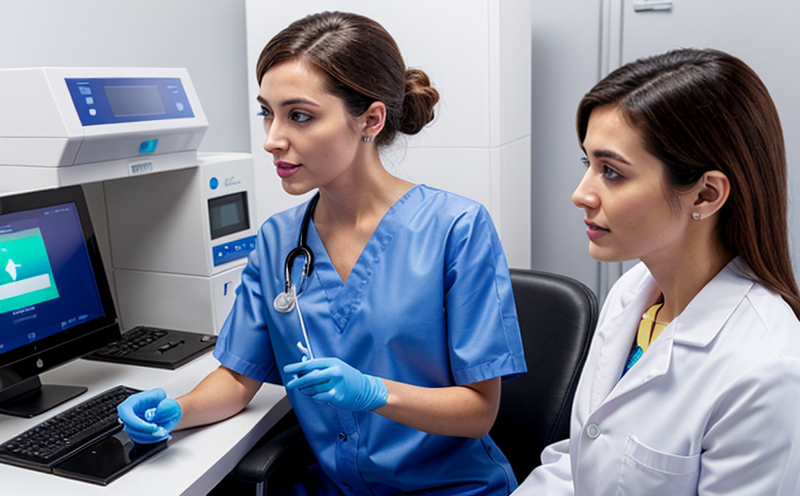PCR Detection of Enteroviruses in Recreational Waters
The polymerase chain reaction (PCR) detection method is a cornerstone technique used to identify and quantify enteroviruses present in recreational waters. This process involves the amplification of viral nucleic acid sequences through repeated cycles of heating, annealing, and extension. Enteroviruses are a group of viruses belonging to the Picornaviridae family that can cause a variety of infections ranging from mild symptoms like hand-foot-and-mouth disease to more severe illnesses such as polio.
Recreational waters include lakes, rivers, and beaches where people swim or engage in water sports. The presence of enteroviruses in these environments poses significant health risks due to the potential for human infection through direct contact with contaminated water. Therefore, regular monitoring and effective detection methods are critical for public health protection.
The PCR method offers several advantages over traditional diagnostic techniques:
- High sensitivity: PCR can detect even minute quantities of viral nucleic acids.
- Rapid results: The entire process typically takes less than 24 hours from sample collection to result reporting.
- Specificity: It targets unique regions of the virus' genome, reducing false positives compared to other methods.
For accurate PCR testing, proper specimen preparation is essential. Samples are collected using sterile swabs or water collection devices and transported on ice to prevent degradation. The extracted nucleic acids undergo purification before being used in the PCR reaction. During the amplification process, primers specific to enterovirus sequences bind to complementary strands of viral DNA or RNA, which then serve as templates for exponential replication.
The resulting amplicons are analyzed using electrophoresis or real-time fluorescence detection methods. Real-time PCR provides continuous monitoring during the amplification steps, allowing precise quantification based on the amount of product formed. This approach also enhances specificity by incorporating probes that only fluoresce when bound to target sequences within the viral genome.
The European Standard ISO 13694:2007 provides guidelines for the detection of enteroviruses in water, emphasizing strict quality control measures and validated protocols. Compliance with these standards ensures reliable results that meet regulatory requirements set by health authorities worldwide.
In summary, PCR technology plays an indispensable role in safeguarding public health by providing quick and accurate identification of enteroviruses in recreational waters. By adhering to established international standards, laboratories ensure consistent accuracy and reliability across all testing processes.
Applied Standards
The primary standard guiding the PCR detection of enteroviruses in recreational waters is ISO 13694:2007. This document specifies procedures for sampling, sample handling, nucleic acid extraction methods, and real-time PCR techniques. Additionally, it outlines quality assurance practices to maintain consistent test performance.
The World Health Organization (WHO) also provides recommendations in its guideline documents on water safety, particularly focusing on microbial indicators that include enteroviruses as potential pathogens. These guidelines help ensure laboratories adopt best practices aligned with global health standards.
Other relevant standards include those from the American Public Health Association (APHA), which focuses on wastewater treatment processes where enteroviruses may be present; and the U.S. Environmental Protection Agency’s (EPA) criteria for assessing pathogen levels in surface waters intended for human contact.
Adherence to these international standards guarantees laboratories deliver consistent, accurate results that comply with local regulations and meet stakeholder expectations regarding water quality assurance programs aimed at protecting public health.
Eurolab Advantages
Eurolab, as a leading provider of PCR detection services for enteroviruses in recreational waters, offers several key advantages:
- Accreditation and Expertise: Our laboratory is fully accredited by the European Committee for Standardization (CEN) according to ISO/IEC 17025:2017. With over two decades of experience in molecular diagnostics, Eurolab employs highly trained professionals who stay updated on the latest technologies and methodologies.
- State-of-the-Art Facilities: Equipped with advanced instrumentation such as ABI ViiA 7 Real-Time PCR Systems, we ensure high-throughput processing capabilities without compromising accuracy or precision. Our facility adheres to strict environmental controls to maintain optimal conditions for sample preparation and amplification.
- Comprehensive Reporting: In addition to detecting the presence of enteroviruses, Eurolab provides detailed reports including concentration levels, comparison against regulatory thresholds, and recommendations for corrective actions if necessary. Our team offers expert interpretation of results tailored specifically to your organization’s needs.
- Patient-Centric Approach: We understand that timely delivery of accurate information is crucial when dealing with public health concerns. Therefore, Eurolab guarantees fast turnaround times without sacrificing quality, ensuring swift decision-making by regulatory bodies or other responsible parties.
By choosing Eurolab for your enterovirus detection needs in recreational waters, you gain access to a trusted partner committed to excellence, innovation, and continuous improvement in laboratory services.
Quality and Reliability Assurance
- Dedicated Quality Control: We implement rigorous internal quality control measures at every stage of the testing process. This includes regular calibration of instruments, verification of reagents, and performance checks on operators.
- Interlaboratory Comparisons: Participating in interlaboratory comparisons ensures our methods remain robust and consistent with industry best practices. Results are compared against benchmark laboratories to identify any discrepancies that require corrective action.
- Data Validation: All data generated during the PCR process undergoes thorough validation before finalization. This includes statistical analysis of variability, reproducibility checks, and compliance verification against specified limits.
- Continuous Improvement Initiatives: Eurolab actively participates in research initiatives aimed at enhancing PCR techniques for enterovirus detection. Regular updates to our protocols based on new findings contribute to maintaining high-quality standards.
The commitment to quality and reliability is embedded within the fabric of Eurolab’s operations, ensuring customers receive dependable results every time they entrust us with their testing needs.





